Two US State Department officials were found wanting when asked a few simple questions this month. Their evasive and half-truth answers said more than straight answers would have to convey the severity of their dereliction of duty and their loyalties to anti-American regimes.
This series of events unfolded at the June 7 hearing of the House Foreign Affairs Subcommittee on Western Hemisphere. Chairwoman Maria Elvira Salazar (R-FL) apologized to Latin American countries for the Biden regime’s mistreatment of and contempt for them.
Two of the witnesses underlined the need for the apology and for congressional investigations of the State Department (DOS). They were the assistant secretaries of state for Western Hemisphere affairs and international narcotics and law enforcement affairs (INL): Brian Nichols and Todd Robinson, respectively.
Protecting a Marxist President in Colombia
Salazar also wanted the testimony of Armando Benedetti—a defector of Colombian President Gustavo Petro—and asked Nichols why Benedetti’s US visa was canceled. Benedetti likely has information that would undermine Petro’s credibility when presented to a US audience.
However, Nichols claimed he had no information and could only refer Salazar to the Bureau of Consular Affairs. Nichols dodged Salazar’s follow-up question and said Benedetti is under investigation in Colombia: “I have full faith in Colombian institutions to get to the bottom of this matter.”
Benedetti’s legal challenges in Colombia should not stop Nichols from arranging a US visa. Further, Nichols’s faith in Petro’s Colombia rings hollow when it contrasts starkly with his hostility towards Guatemala. Nichols has been an open advocate for former prosecutors and judges wanted by Guatemala but living in the United States under DOS protection. Their crimes are in the public domain, as are some of their bank accounts with money they could not have earned legally.
Likewise, Nichols’s faith in Colombian institutions under Petro is ideologically selective. As Colombian Senator Maria Fernanda Cabal has said, Petro “has confronted the judicial branch and attorney general regarding their rejection of Petro’s public orders to free convicted criminals. Defense Minister Iván Velásquez, a long-time Petro ally, has been working to politicize the army and police to use them against Petro’s enemies, including to infringe on the independence of the judicial system.”
Salazar asked Nichols if he would help if Benedetti wanted to testify. Nichols replied “I don’t have the authority to issue visas.” Salazar immediately shot back “Sure you do.” Nichols could, since DOS has complete jurisdiction over visas, but he simply did not want to commit.
Does He, Does He Not Work with the Attorneys General?
Salazar turned to Robinson and set the tone by quoting from his opening statement that “antidemocratic governments have gained power.” She continued, “That’s true, and I wish you were talking about Nicaragua, Venezuela, or Cuba, but you are talking about Guatemala and El Salvador.” Salazar stated this meant Robinson would not work with the attorneys general from these two countries, both important to the United States.
To defend his rejection of the Guatemalan and Salvadoran attorneys general, Robinson said they had been “sanctioned by the Biden-Harris administration for either anti-democratic or corrupt…” Salazar quickly stated there are many antidemocratic governments “that you work with all the time.” She mentioned Cuba, Venezuela, and Nicaragua as examples.
When pressed, Robinson was trapped and slipped up: “We are working with those prosecutors that we think can be useful and are not working in an antidemocratic or corrupt manner.”
If INL works with Guatemala’s Public Ministry, as DEA does for example, INL must work with the prosecutors Attorney General Consuelo Porras assigns. It would be illegal for INL to work with specific prosecutors of Robinson’s choosing. Either Robinson answered inaccurately, or he admitted committing crimes.
Salazar finished exposing Robinson by referring to his having said he could work with Honduras because it is less corrupt than the other two. Salazar pointed out that the first act of Honduras’s president was to pardon all the officials of her husband’s administration (2006–2009) who were in jail for corruption.
Salazar questioned Nichols regarding whether anyone in the US government received a call from anyone in the Petro administration to cancel Benedetti’s visa. While Nichols denied knowledge of any call, Robinson was sweating right next to him. There is a strong likelihood that Robinson received such a call from Velásquez. The pair’s work overlapped in Guatemala, when Velásquez was commissioner of the UN-created anti-impunity commission (2014–2019).
Robinson and Velásquez are bonded by having committed crimes together. Porras’s ministry has announced it is pursuing criminal charges against Velásquez.
Using corruption as hypocritical cover, Robinson and Nichols showed they favor corrupt anti-American leftists and oppose conservatives. This is despite the harm that comes from ignoring US allies, the theme of the hearing. Salazar did a magnificent job in the hearing, but the format only permits scratching the surface.
The ugly truth the pair hides is a viper’s nest of DOS criminality in pursuing their anti-American agenda. To expose that and protect our national security, Salazar needs investigators and a series of investigations and hearings.
Read the original on BizPac Review.
 Join us in our mission to foster positive relations between the United States and Latin America through independent journalism.
Join us in our mission to foster positive relations between the United States and Latin America through independent journalism.
As we improve our quality and deepen our coverage, we wish to make the Impunity Observer financially sustainable and reader-oriented. In return, we ask that you show your support in the form of subscriptions.
Non-subscribers can read up to six articles per month. Subscribe here.

